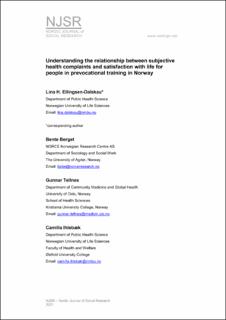Understanding the relationship between subjective health complaints and satisfaction with life for people in prevocational training in Norway
Peer reviewed, Journal article
Published version
Permanent lenke
https://hdl.handle.net/11250/2726698Utgivelsesdato
2021Metadata
Vis full innførselSamlinger
Originalversjon
Nordic Journal of Social Research. 2021, 12 (1), 48-71.Sammendrag
Background and aim: In Norway, a large part of the population is dependent on disability benefits. The main reasons for this are related to long-term musculoskeletal pain and psychological complaints. Prevocational rehabilitation, aimed at increasing participation in working life, targets people in need of a sheltered vocational environment. This group has been found to report a very high level of health complaints. Therefore, a better understanding of the psychological mechanisms affecting satisfaction with life for people who experience subjective health complaints could be important for tailoring more optimal vocational rehabilitation initiatives for these individuals. This study aimed to investigate the possible mediator role of basic psychological need satisfaction, described in self-determination theory, in the relationship between subjective health complaints and satisfaction with life.
Methods: A total of 201 adult participants attending prevocational training on care farms in Norway answered a questionnaire, including demographic questions and standardised instruments on subjective health complaints, basic psychological need satisfaction and satisfaction with life. Analyses were conducted using a structural equation model.
Results: Most of the participants had been out of work for more than one year, had a high prevalence of subjective health complaints and a low level of satisfaction with life. The structural equation model showed that basic psychological need satisfaction mediated the negative association between psychological health complaints and satisfaction with life.
Conclusion: The results indicate that even though health complaints remain, prevocational programs can counteract some of the negative associations between subjective health complaints and satisfaction with life by creating contexts that support basic psychological needs that are important for well-being and functioning. Providing clients with understanding, guidance, positive feedback, meaningful tasks and a close, supportive social community, has been found to facilitate satisfaction of basic psychological needs in prevocational training on care farms.

